Her story is shocking. Raped at 8 and pregnant at 10, she was forced to marry her rapist at 11. She had to abandon high school after the babies kept coming. For years, she kept silent. But now, her voice rings clear in chambers where the state's laws are made. Her unrelenting public pleas to end child marriage are being heard.After a lifetime of struggle, Johnson's time has come. Finally.At 58, she sports a head full of thick, tight curls and a pantsuit that would make Hillary Clinton proud. She navigates the corridors of the Capitol with a black binder tucked under her left arm, a purse slung over her shoulder and a fierce look of determination. I struggle to keep pace with her as she makes her way past sepia-toned photographs celebrating Florida in the early 20th century, as though they were glorious times for everyone. Past the rows and rows of framed faces of lawmakers who gained fame within these walls. "All men," Johnson observes, as we dash by.On this winter morning, days into the 2018 legislative session, she is on her way to meet with a state senator co-sponsoring a bill to abolish child marriage in Florida. An identical version has been introduced in the House.Johnson has spent the last five years lobbying lawmakers to stop the kind of abuse she suffered in her childhood. An effort to ban child marriage under the age of 16 got traction in the Florida House in 2014 but went nowhere in the Senate. Since then, Johnson's words have fallen on deaf ears. Doors have closed on her. Until recently.As incredible as this may sound, Florida stands poised to become the first state in America to say no, unequivocally, to all marriages of minors. Last year, Texas and Virginia enacted new laws limiting marriage to those 18 and over, but they made narrow exceptions for minors granted adult rights by the courts. The bills before the Florida legislature set 18 as the age for marriage and allow zero exceptions. In Suite 202 of the Senate Office Building, Johnson gets a hug from Lauren Book, a 33-year-old senator from the south Florida city of Plantation who herself is a child abuse survivor and activist. Book has blond hair, a Florida tan and big, bookish glasses. Her walls are blanketed by inspirational quotations from Plato, Shakespeare and even Coco Chanel: "If you're sad, add more lipstick and attack." She displays a brass desk plate that asks: "What would Beyonce do?"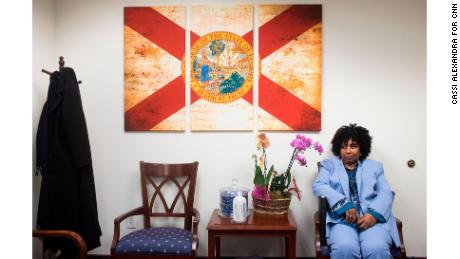 "Sherry and I have a lot in common," Book tells me. "Until you put a face on this issue, people don't understand," she adds. "And Sherry has been that face. She has been able to destigmatize the process."Book signed on as co-sponsor of the Senate child marriage bill introduced by Lizbeth Benacquisto, a Fort Myers Republican and rape survivor. The two women legislators embraced the #MeToo movement and have been vocal on sexual misconduct allegations clouding the Florida Legislature. In Book, Johnson sees an ally. If the bill passes, Johnson wants to stage a play based on her 2013 autobiographical novel, "Forgiving the Unforgiveable." She's also compiled a budget for a bus tour to promote awareness. She asks Book to help her brainstorm ways to raise money. "When the bill passes, I want the community to know this has happened," Johnson says. "I just want ideas. This is all so new to me.""You've been working so hard to make all this happen," Book replies. "You have a lot going on. Take a break.""I can't relax right now," Johnson says without hesitation. "I'm on a journey."
"Sherry and I have a lot in common," Book tells me. "Until you put a face on this issue, people don't understand," she adds. "And Sherry has been that face. She has been able to destigmatize the process."Book signed on as co-sponsor of the Senate child marriage bill introduced by Lizbeth Benacquisto, a Fort Myers Republican and rape survivor. The two women legislators embraced the #MeToo movement and have been vocal on sexual misconduct allegations clouding the Florida Legislature. In Book, Johnson sees an ally. If the bill passes, Johnson wants to stage a play based on her 2013 autobiographical novel, "Forgiving the Unforgiveable." She's also compiled a budget for a bus tour to promote awareness. She asks Book to help her brainstorm ways to raise money. "When the bill passes, I want the community to know this has happened," Johnson says. "I just want ideas. This is all so new to me.""You've been working so hard to make all this happen," Book replies. "You have a lot going on. Take a break.""I can't relax right now," Johnson says without hesitation. "I'm on a journey."
'I'm coming out'
I first spoke with Johnson a couple of months ago and was taken aback that child marriage was still a persistent problem in the United States. 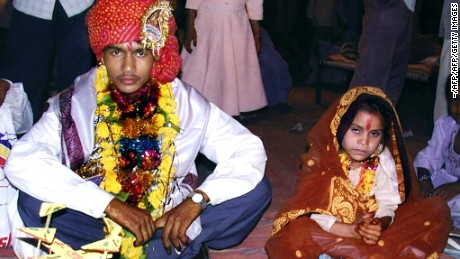 Child marriages are legal in every US state because of a hodgepodge of exceptions that let minors get married with parental consent or judicial approval. A majority of these marriages are coerced and involve girls marrying adult men, according to the Tahirih Justice Center, a national nonprofit group that tracks child marriage and aims to end gender-based violence.The US State Department considers forced marriage a human rights abuse and, in the case of minors, a form of child abuse. Though child marriages represent a fraction of all US marriages, the numbers remain significant. The Pew Research Center found that in 2014, nearly 60,000 15- to 17-year-olds were in marriages. Few perceive America as a land where child marriage occurs; we think of developing nations like Afghanistan, Somalia and my homeland, India, which ignobly led the world with almost 27 million child marriages in 2017.
Child marriages are legal in every US state because of a hodgepodge of exceptions that let minors get married with parental consent or judicial approval. A majority of these marriages are coerced and involve girls marrying adult men, according to the Tahirih Justice Center, a national nonprofit group that tracks child marriage and aims to end gender-based violence.The US State Department considers forced marriage a human rights abuse and, in the case of minors, a form of child abuse. Though child marriages represent a fraction of all US marriages, the numbers remain significant. The Pew Research Center found that in 2014, nearly 60,000 15- to 17-year-olds were in marriages. Few perceive America as a land where child marriage occurs; we think of developing nations like Afghanistan, Somalia and my homeland, India, which ignobly led the world with almost 27 million child marriages in 2017.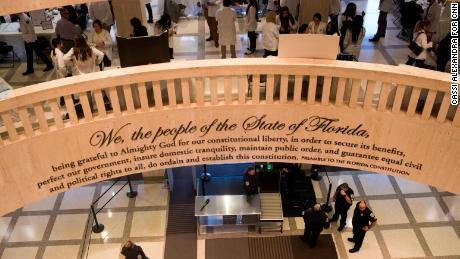 My own grandmother was the same age as Johnson — 11 — when she was married off to my grandfather. My great aunt was 14 on her wedding day. When her husband died soon after, she led the austere life of a Hindu widow, ostracized by society until her death at 90 as though she were somehow to blame. I was drawn to Johnson's story and am even more so now, when increasing numbers of women are feeling empowered to speak out about abuse. The women's movement has been gaining momentum and has helped push forward child marriage bills. Besides Florida, a dozen other states have legislation pending, though not all would set a strict age floor at 18.In Florida, Johnson has been instrumental. She has been vocal about the cruel story of her childhood. She hopes that one day soon, she might be able to stand next to the governor as he signs a child marriage ban into law.That would be the vindication she has so earnestly sought.There has been little opposition to the bill, though critics would still like Florida to make exceptions for minors who are voluntary participants or if their would-be spouses are in the military. Young servicemen and women sometimes want to marry their girlfriends or boyfriends before deploying on dangerous missions.
My own grandmother was the same age as Johnson — 11 — when she was married off to my grandfather. My great aunt was 14 on her wedding day. When her husband died soon after, she led the austere life of a Hindu widow, ostracized by society until her death at 90 as though she were somehow to blame. I was drawn to Johnson's story and am even more so now, when increasing numbers of women are feeling empowered to speak out about abuse. The women's movement has been gaining momentum and has helped push forward child marriage bills. Besides Florida, a dozen other states have legislation pending, though not all would set a strict age floor at 18.In Florida, Johnson has been instrumental. She has been vocal about the cruel story of her childhood. She hopes that one day soon, she might be able to stand next to the governor as he signs a child marriage ban into law.That would be the vindication she has so earnestly sought.There has been little opposition to the bill, though critics would still like Florida to make exceptions for minors who are voluntary participants or if their would-be spouses are in the military. Young servicemen and women sometimes want to marry their girlfriends or boyfriends before deploying on dangerous missions.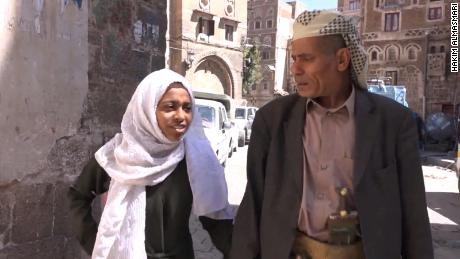 To that argument, Johnson retorts: If you are under 18, you cannot make any other legal decisions. You cannot buy a house, join the military, vote, rent a car or drink alcohol. How is it possible then to make a wise decision about entering into a legally binding partnership, one that is meant to be permanent?Johnson leaves Book's office brimming with excitement. "You know that song, 'I'm Coming Out' by Diana Ross?" she asks as we climb into her car. She starts belting out the lyrics: I want the world to know… There's a new me coming out. And I just had to live. And I want to give. I'm completely positive."This is exactly what's happening," she says. "People are coming out. My soul is so happy right now."She has ambitions to organize a conference for survivors of child abuse and child marriage, so they can express themselves in public, just like she did when she testified before lawmakers. "So they can get it all out," she says. She knows the importance of that firsthand.
To that argument, Johnson retorts: If you are under 18, you cannot make any other legal decisions. You cannot buy a house, join the military, vote, rent a car or drink alcohol. How is it possible then to make a wise decision about entering into a legally binding partnership, one that is meant to be permanent?Johnson leaves Book's office brimming with excitement. "You know that song, 'I'm Coming Out' by Diana Ross?" she asks as we climb into her car. She starts belting out the lyrics: I want the world to know… There's a new me coming out. And I just had to live. And I want to give. I'm completely positive."This is exactly what's happening," she says. "People are coming out. My soul is so happy right now."She has ambitions to organize a conference for survivors of child abuse and child marriage, so they can express themselves in public, just like she did when she testified before lawmakers. "So they can get it all out," she says. She knows the importance of that firsthand.
A mother and wife by fifth grade
As a little girl, Johnson lived with her mother in Tampa in the back of the parsonage of their church. She was an only child.Johnson and her mother belonged to an apostolic church and went to mandatory service six days a week, sometimes seven. Hats and long sleeves were required for the girls and women; they could not wear pants or jewelry. They behaved in accordance with strict church guidelines, and the elders told them what they could say or do. Johnson's mother spent little time with her. When she did, it was to bake biscuits and fruit pies for the church. There was no television in the house, but her mother would, on occasion, sit down with Johnson with a coloring book and pencils. That is the fondest memory Johnson has of her childhood. 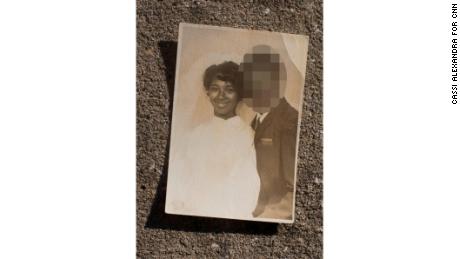 Each day before school, Johnson sought out her aunt for lunch money because Johnson's mother worked as a substitute teacher and could barely make ends meet. Her aunt lived nearby in the same house as the bishop of their church, and one day, when Johnson was 8, he summoned her into his bedroom.I got your lunch money. Come and get it. He forced her to lie on the bed, used petroleum jelly and penetrated her. He said nothing and then sent her on her way, blood dripping down her legs. Johnson ran to a bathroom to wash herself, but she was a child in the fourth grade. She could not understand what had happened. After that, she was raped repeatedly by the bishop and also a church deacon. But when she tried to talk about it, no one believed her, not even her mother. It happened so frequently that Johnson accepted it as a part of growing up. Her elementary school classmates cruelly told her she smelled like fish.Several months passed when, one day in class, she was summoned to a room where students received their vaccinations. Johnson was confused. She never got shots; her church forbade them.She was examined by a nurse and sent back to class. A few minutes later, she heard her name again, blaring through the intercom. She was to collect all her belongings and wait in the office for her mother to pick her up. What had she done wrong? You're going to have a baby, her mother blurted out in the car. Who's been messing with you? I tried to tell you, Johnson replied. But you said I was lying.A doctor examined her and gave her the news: She was seven months pregnant. She did the math and knew it was the deacon's baby.Her mother stood up in church and told everyone her daughter was lying about being raped. She blamed Johnson for bringing shame on the family and sent her away to Miami with the bishop who had raped her. She was dropped off at Jackson Memorial Hospital and left there alone to have her baby.On a February night in 1970, Johnson, only 10 years old, waited in a hospital hallway. She tried to imagine how a baby would come out of her body; no one had explained it to her. The stares burned through her; she felt like an oddity at an amusement park.At 1:54 a.m., she gave birth to her first child. When she returned to Tampa, a child welfare worker came by to ask questions. She figures her elementary school must have tipped off the state. The men who had raped her were adults and if the truth were to surface, they would face statutory rape charges. Instead, Johnson's mother arranged for her daughter to marry one of her rapists, the deacon. She bought a white dress and veil for her daughter and accompanied bride and groom to the Hillsborough County courthouse in Tampa. Johnson was 11. The man she was marrying was 20. Johnson remembers sitting at a long table that seemed bigger than her house. She remembers her mother speaking with the judge. The judge refused to marry a girl so young, even though she had a baby.But a month later, they tried again, this time in neighboring Pinellas County, where Johnson was allowed to sign on the dotted line. The judge was fully aware of her age; the license lists her date of birth.She had not finished fifth grade yet on March 29, 1971, when she became a wife as well as a mother.So began a life of burden, a life she was forced to accept.
Each day before school, Johnson sought out her aunt for lunch money because Johnson's mother worked as a substitute teacher and could barely make ends meet. Her aunt lived nearby in the same house as the bishop of their church, and one day, when Johnson was 8, he summoned her into his bedroom.I got your lunch money. Come and get it. He forced her to lie on the bed, used petroleum jelly and penetrated her. He said nothing and then sent her on her way, blood dripping down her legs. Johnson ran to a bathroom to wash herself, but she was a child in the fourth grade. She could not understand what had happened. After that, she was raped repeatedly by the bishop and also a church deacon. But when she tried to talk about it, no one believed her, not even her mother. It happened so frequently that Johnson accepted it as a part of growing up. Her elementary school classmates cruelly told her she smelled like fish.Several months passed when, one day in class, she was summoned to a room where students received their vaccinations. Johnson was confused. She never got shots; her church forbade them.She was examined by a nurse and sent back to class. A few minutes later, she heard her name again, blaring through the intercom. She was to collect all her belongings and wait in the office for her mother to pick her up. What had she done wrong? You're going to have a baby, her mother blurted out in the car. Who's been messing with you? I tried to tell you, Johnson replied. But you said I was lying.A doctor examined her and gave her the news: She was seven months pregnant. She did the math and knew it was the deacon's baby.Her mother stood up in church and told everyone her daughter was lying about being raped. She blamed Johnson for bringing shame on the family and sent her away to Miami with the bishop who had raped her. She was dropped off at Jackson Memorial Hospital and left there alone to have her baby.On a February night in 1970, Johnson, only 10 years old, waited in a hospital hallway. She tried to imagine how a baby would come out of her body; no one had explained it to her. The stares burned through her; she felt like an oddity at an amusement park.At 1:54 a.m., she gave birth to her first child. When she returned to Tampa, a child welfare worker came by to ask questions. She figures her elementary school must have tipped off the state. The men who had raped her were adults and if the truth were to surface, they would face statutory rape charges. Instead, Johnson's mother arranged for her daughter to marry one of her rapists, the deacon. She bought a white dress and veil for her daughter and accompanied bride and groom to the Hillsborough County courthouse in Tampa. Johnson was 11. The man she was marrying was 20. Johnson remembers sitting at a long table that seemed bigger than her house. She remembers her mother speaking with the judge. The judge refused to marry a girl so young, even though she had a baby.But a month later, they tried again, this time in neighboring Pinellas County, where Johnson was allowed to sign on the dotted line. The judge was fully aware of her age; the license lists her date of birth.She had not finished fifth grade yet on March 29, 1971, when she became a wife as well as a mother.So began a life of burden, a life she was forced to accept.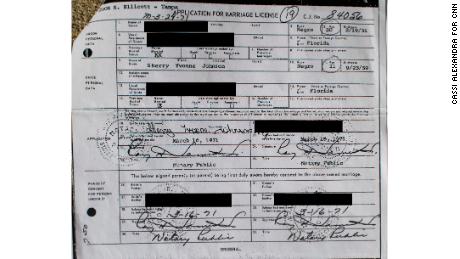 Marriage before adulthood often has crushing consequences, undermining a girl's access to health, education and economic opportunities. Girls and women in abusive relationships often suffer from low self-esteem and can fall into a self-destructive pattern of attracting more exploitation. Johnson was no exception.At first, she returned to school while her mother looked after the baby. But her church prohibited the use of birth control, and Johnson had baby after baby. Her husband abandoned her each time she was pregnant. She had no choice but to take him back when he returned after the baby was born. They lived in the same parsonage house with Johnson's mother and slept in Johnson's old bedroom surrounded by cribs.Girls her age played with baby dolls. Johnson found herself with real babies. She washed diapers, cleaned the house and cooked one-pot stews. Her husband rarely spoke with her; she was just there for sex. They struggled to pay the bills. She was too young to know how to act, so she watched married couples in church and mimicked their behavior at home. She loved studying and even skipped a grade one year. As it turned out, school was the only normal thing in her life. But that, too, was taken from her. She made it somehow to the ninth grade but then could go on no longer. By the time she was 17, she was raising six children. She never knew what it was like to play sports or go to the prom or graduate. Robbed of her childhood, she lost all motivation.Every day when she woke up, she cried.
Marriage before adulthood often has crushing consequences, undermining a girl's access to health, education and economic opportunities. Girls and women in abusive relationships often suffer from low self-esteem and can fall into a self-destructive pattern of attracting more exploitation. Johnson was no exception.At first, she returned to school while her mother looked after the baby. But her church prohibited the use of birth control, and Johnson had baby after baby. Her husband abandoned her each time she was pregnant. She had no choice but to take him back when he returned after the baby was born. They lived in the same parsonage house with Johnson's mother and slept in Johnson's old bedroom surrounded by cribs.Girls her age played with baby dolls. Johnson found herself with real babies. She washed diapers, cleaned the house and cooked one-pot stews. Her husband rarely spoke with her; she was just there for sex. They struggled to pay the bills. She was too young to know how to act, so she watched married couples in church and mimicked their behavior at home. She loved studying and even skipped a grade one year. As it turned out, school was the only normal thing in her life. But that, too, was taken from her. She made it somehow to the ninth grade but then could go on no longer. By the time she was 17, she was raising six children. She never knew what it was like to play sports or go to the prom or graduate. Robbed of her childhood, she lost all motivation.Every day when she woke up, she cried.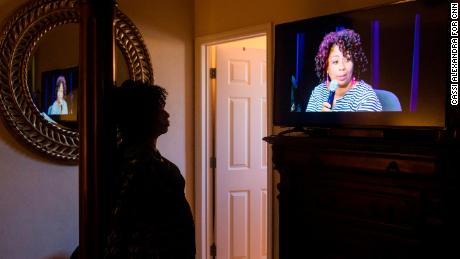 It was her husband who should have been handcuffed, she thought. She felt she was handcuffed instead.She grew tired of her husband's lack of support and sought help from Legal Aid. They wrote her a check for $75 to pay an attorney to file for divorce. But not long after, at 19, she married a 37-year-old man. He, too, hurt her verbally and physically. She bore three more children and was 27 when her youngest daughter was born.By then, Johnson felt the weight of nine children — five girls and four boys — and an abusive husband pulling her down. She was frustrated, tired, bitter and, most of all, angry that this life had been forced on her. It began to affect her relationships with her kids. She hollered and fussed at them more often and tried her best to remember they didn't ask to be born. It wasn't their fault. She smiled on the outside, but inside she was always crying.She felt worthless and even contemplated driving her car off the Howard Frankland Bridge that spans Tampa Bay.It was only after she left her mother's church that Johnson was able to start healing. Through a new church, she met a psychologist, Joan Gaines. The two women began talking. It was the first time, really, that anyone had listened to her. It had taken almost half her life for Johnson to find her voice.
It was her husband who should have been handcuffed, she thought. She felt she was handcuffed instead.She grew tired of her husband's lack of support and sought help from Legal Aid. They wrote her a check for $75 to pay an attorney to file for divorce. But not long after, at 19, she married a 37-year-old man. He, too, hurt her verbally and physically. She bore three more children and was 27 when her youngest daughter was born.By then, Johnson felt the weight of nine children — five girls and four boys — and an abusive husband pulling her down. She was frustrated, tired, bitter and, most of all, angry that this life had been forced on her. It began to affect her relationships with her kids. She hollered and fussed at them more often and tried her best to remember they didn't ask to be born. It wasn't their fault. She smiled on the outside, but inside she was always crying.She felt worthless and even contemplated driving her car off the Howard Frankland Bridge that spans Tampa Bay.It was only after she left her mother's church that Johnson was able to start healing. Through a new church, she met a psychologist, Joan Gaines. The two women began talking. It was the first time, really, that anyone had listened to her. It had taken almost half her life for Johnson to find her voice.
Forgiveness
I listened to Johnson recount her story, but I couldn't fully understand how she was able to heal after such horrific experiences. I called Gaines for her perspective."She was a child with nine children," Gaines told me. "She began to grow up much later in her life."Gaines described Johnson as a smart, resilient woman who was keen on setting herself on a better path. She was like a round-bottomed roly-poly toy: No matter how many times you knock it over, it comes right back up.Gaines, too, was an only child, but she had a happy childhood. Johnson's mother's actions were beyond comprehension. "You don't have to be nurturing to be a mother," Gaines said. "All you have to have is a vagina."Johnson leaned on Gaines and looked inward. She turned to her faith in God, and she learned to forgive her rapists, her mother and, most important, herself. It was time, she realized, to escape the dungeon of bitterness that was sapping her energy. The past was hurting her because she had chosen to hold onto it. For Johnson, forgiveness was the only way to move forward, the only way she could speak freely about what she had suffered so she could save others. 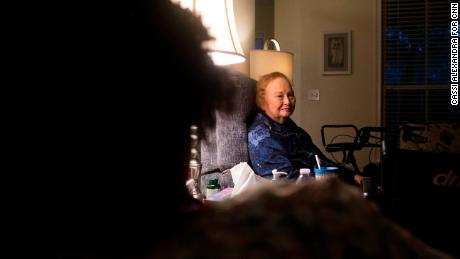
'The whole state of Florida failed me'
Hours after her jaunt to the Capitol, Johnson makes her way across town to see Tommye Hutto, a 78-year-old woman curtailed by rheumatoid arthritis. Playing lobbyist is Johnson's passion, but her job as a private caregiver pays the bills. She also had been teaching behavior-challenged children at an elementary school but gave that up to focus her energy on the legislative session.Hutto retired as communications director for the California Teachers Union and moved to Tallahassee to be near her daughters. She lives by herself in north Tallahassee, needs assistance around the house and is one of several elderly clients Johnson sees.The day before, Johnson helped a woman in her 90s who can no longer fend for herself. Johnson fixed her a dinner of fish sticks and steak fries and then wrote out a checklist: Make sure the bed rails are up on both sides in the highest position; insert an extra pad in the adult diaper for absorbency; check that her life alert is around her neck; empty the trash; tidy the house.I watched Johnson intently before blurting out the obvious question: "What's it like to take care of people after you did nothing but that all your life?""Well, I have to earn money somehow," she answered.She took this job, she explained, because caregiving is what she's good at. She raised nine children, after all.She moved to north Florida in 2008 after she remarried again. She and her third husband ran a barbecue place together in Tallahassee. But that marriage, too, ended in divorce.Johnson could have returned to Tampa, where all her children were. But that was when she felt a calling. She felt compelled to share her story to make things better so no one else would have to endure what she had. She did not want her obituary to be confined to mother, grandmother and divorcee. She stayed in Tallahassee and launched her crusade. She turned a small third bedroom into a home office and surrounded herself with her achievements. They serve as reminders that her life is no longer broken: a volunteer of the year award, a congratulatory letter on her book from Michelle Obama, a high school diploma from Franklin Academy. Johnson took classes online and at the age of 55, marched in the school's 2015 commencement ceremony. By her desk is a card one of her sons sent her on Valentine's Day. "Of all the moms in the world, you are by far the best the world has seen." 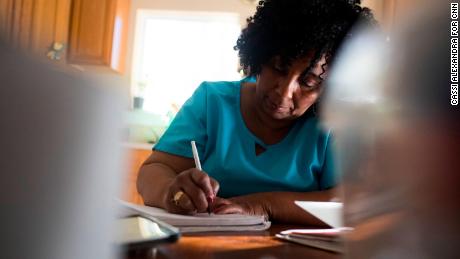 Despite her struggles, Johnson has no regrets about having her children."I still feel like I did everything I could do as a parent. I gave it my best shot with what I had," she told me. "I don't feel less than a mother."On this evening at Hutto's house, her motherly instincts kick into gear. She fixes dinner for Hutto and plops down on the living room couch. It feels like a long day after her rounds at the Capitol. Sometimes, the two women watch "Wheel of Fortune" together. Tonight, they decide on conversation instead. They discuss the tribulations of aging and one of their favorite foods: fried chicken from the Publix deli. And, they talk about the one thing they have in common: being an only child."I guess there's good and bad to that," Hutto says."What's the good part?" Johnson asks."Well, you get all the attention. You get to choose what you want. It's fun.""I don't know any fun part," Johnson says, raising her eyebrows.Hutto knows most of Johnson's story and was, like others, in disbelief that such things could happen in America. She's glad to know the child marriage bill is well on its way to becoming law and that it's getting attention. "What caused you to start advocating?" Hutto asks, her curiosity piqued.Johnson mentions her book and a non-profit she launched to support abuse victims after she began speaking at small gatherings and realized the need. Hutto says she knew of one girl in her high school who got pregnant, had her baby and then came back to school. But she didn't get married."Did you know there were over 200,000 child marriages in America in the last 14 years," Johnson says. "Over 16,000 were in Florida.""That's amazing," Hutto replies. "I had no idea. How did we not know?"Johnson brings up her own case."The hospital knew. The school knew. The courts knew," she says. "So plenty of people knew, but nothing was done. The whole state of Florida failed me. "I feel my life was taken from me," she says. "The ones who were supposed to protect me, didn't."No response seems appropriate in this moment, and seconds pass in silence. Johnson looks down and takes a slow bite of fried chicken. In a few days, she will be back at the Capitol, making her rounds — and hoping that the state that failed her will not fail again.
Despite her struggles, Johnson has no regrets about having her children."I still feel like I did everything I could do as a parent. I gave it my best shot with what I had," she told me. "I don't feel less than a mother."On this evening at Hutto's house, her motherly instincts kick into gear. She fixes dinner for Hutto and plops down on the living room couch. It feels like a long day after her rounds at the Capitol. Sometimes, the two women watch "Wheel of Fortune" together. Tonight, they decide on conversation instead. They discuss the tribulations of aging and one of their favorite foods: fried chicken from the Publix deli. And, they talk about the one thing they have in common: being an only child."I guess there's good and bad to that," Hutto says."What's the good part?" Johnson asks."Well, you get all the attention. You get to choose what you want. It's fun.""I don't know any fun part," Johnson says, raising her eyebrows.Hutto knows most of Johnson's story and was, like others, in disbelief that such things could happen in America. She's glad to know the child marriage bill is well on its way to becoming law and that it's getting attention. "What caused you to start advocating?" Hutto asks, her curiosity piqued.Johnson mentions her book and a non-profit she launched to support abuse victims after she began speaking at small gatherings and realized the need. Hutto says she knew of one girl in her high school who got pregnant, had her baby and then came back to school. But she didn't get married."Did you know there were over 200,000 child marriages in America in the last 14 years," Johnson says. "Over 16,000 were in Florida.""That's amazing," Hutto replies. "I had no idea. How did we not know?"Johnson brings up her own case."The hospital knew. The school knew. The courts knew," she says. "So plenty of people knew, but nothing was done. The whole state of Florida failed me. "I feel my life was taken from me," she says. "The ones who were supposed to protect me, didn't."No response seems appropriate in this moment, and seconds pass in silence. Johnson looks down and takes a slow bite of fried chicken. In a few days, she will be back at the Capitol, making her rounds — and hoping that the state that failed her will not fail again.
Original Article
[contf] [contfnew] 
CNN
[contfnewc] [contfnewc]






